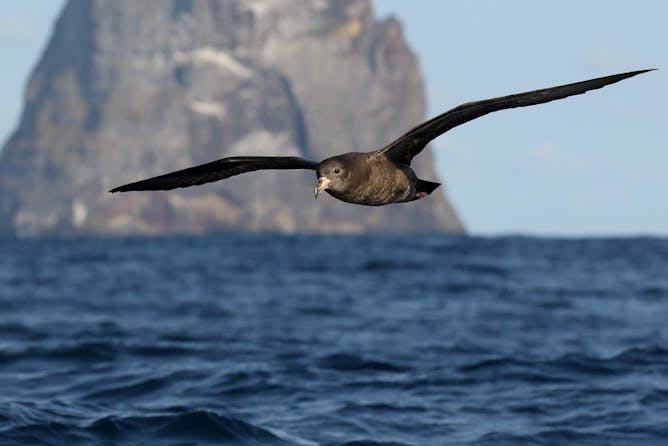|
The world’s oceans are permeated with plastic waste, from surface waters to some of their deepest reaches. And we know from numerous studies that fish, turtles, seabirds and smaller sea creatures are ingesting bits of plastic when they feed. Now, scientists are starting to pin down the effects of a plastic diet.
Marine scientist Matthew Savoca explains findings from a recent study that identified a new illness, which the authors call plasticosis, in seabirds. Scarring in the birds’ digestive tracts resembles effects in humans who are longtime smokers or have been exposed to asbestos. As Savoca sees it, plasticosis “could be a sign that a new age of disease is upon us because of human overuse of plastics and other long-lasting contaminants, and their leakage into the environment.”
Also today:
|

|
Jennifer Weeks
Senior Environment + Energy Editor
|
|

Scientists have identified a condition they call plasticosis, caused by ingesting plastic waste, in flesh-footed shearwaters.
Patrick Kavanagh/Wikipedia
Matthew Savoca, Stanford University
Many marine animals, birds and fish are ingesting plastic. New research identifies the first named health effect from it.
|
Politics + Society
|
-
Shelley Inglis, University of Dayton
When former President Donald Trump summoned his fans to protest over what he called his imminent indictment, a scholar of democracy saw it as an autocratic move.
-
Andrew Mines, George Washington University; Amira Jadoon, Clemson University
ISIS-K’s recent killings of Taliban brass are part of the extremist group’s long-term strategy. Will Taliban leaders contain the resurgence of violence?
|
|
Economy + Business
|
-
Cassandra Jones Havard, University of South Carolina
The failure of Silicon Valley Bank has raised questions about some of the consequences when the government steps in to protect the depositors of troubled banks.
|
|
Education
|
-
Amaarah DeCuir, American University
Federal law protects students’ rights to request some religious accommodations, including during the month of Ramadan
|
|
Science + Technology
|
-
Hannah L. Schacter, Wayne State University; Adam Hoffman, Cornell University; Alexandra Ehrhardt, Wayne State University
Friendships are important, but are they always healthy? New research finds that teens who feel dominated by their friends experience lower self-esteem and more symptoms of anxiety and depression.
-
Brad Reisfeld, Colorado State University
From ‘Breaking Bad’ to James Bond, certain chemicals are popular options for characters looking to achieve nefarious ends.
|
|
Health + Medicine
|
-
Brian King, Penn State; Andrea Rishworth, University of Toronto; Louisa M. Holmes, Penn State; Ruchi Patel, Penn State
Pennsylvania has long had one of the highest death rates from drug overdose in the US. But new studies suggest counties throughout the state have different rates of opioid deaths.
|
|
Environment + Energy
|
-
Robert Lempert, Pardee RAND Graduate School; Elisabeth Gilmore, Carleton University
Two experts in policy and technology who were also co-authors of an international climate assessment see reasons for optimism.
|
|
Arts + Culture
|
-
Monika Schmitter, UMass Amherst
What will happen to this villa and its unique collection of 16th- and 17th-century ceiling paintings?
|
|
|
|
From our international editions
|
|
|
|
|
|
| |
| |
| |
| |
|
|